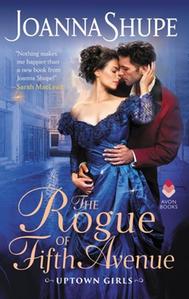
|
|
| photo: Kathryn Huang Photography | |
Historical romance author Joanna Shupe has received the Romance Writers of America's coveted Golden Heart Award, and her novels have appeared on multiple bestseller lists. In the start to a new series, The Rogue of Fifth Avenue (reviewed below), society heiress Mamie Green longs for a more meaningful existence and befriends tenement families in 1890s New York City. When her father's attorney, Jack Tripp, attempts to stop her, life quickly becomes very complicated for both of them. Shupe lives in New Jersey with her family.
Tell us about how you research and what led you to set this and earlier works in 1890s New York City.
I've been obsessed with the Gilded Age since I read Edith Wharton's The Age of Innocence as a teenager, and soon started visiting New York City every chance I got. After college, I moved to Chicago (another great Gilded Age city) and then to New York a few years later. I've stayed in the area ever since. Luckily, I get to take lots of research trips into the city.
New York City was such a fascinating place in the late 19th century. It was the first stop for millions of people as they arrived from Europe, including my Dad's grandparents. On the other end was the old guard of high society, with its rigid rules and social hierarchy, along with the captains of industry who were transforming America's banking and transportation. So much of what we are as a country today comes from the Gilded Age, and New York City was really the epicenter of finance and invention. It's all of these different extremes that make storytelling in those years so interesting.
The contrast between the wealthy families of Fifth Avenue and the grindingly poor in the city lend depth to the novel. Did you base your characters' situations on actual people from the era?
Not specific people, no. But the Tenement Museum on the Lower East Side of New York is one of my favorite places. The restored tenement apartments give a detailed glimpse of what it would have been like to live there at the turn of the 20th century. Jacob Riis's How the Other Half Lives is a book I've often referenced for inspiration as well. He was a photographer who chronicled the city's struggling neighborhoods in 1890. I also read criminal court transcripts from that era, which gave me a good idea of the types of cases that were tried.
Mamie's views on women's rights are certain to resonate with today's readers. Did you set out to write a novel about contemporary issues in an historical setting or was this a natural evolution for your characters?
Women were a lot more progressive in history than we give them credit for. Domestic violence, substance abuse and the rights of women were very much topics of the day in the late 19th century. It's heartening to see how far we've come in some areas, but sad how little we've moved the needle in others.
 Your heroine's sisters are so intriguing. Might we see future books featuring them?
Your heroine's sisters are so intriguing. Might we see future books featuring them?
Yes! Florence is getting her own story next in The Prince of Broadway. That book takes place concurrently with Mamie and Frank's story. Justine will be the third story, tentatively titled The King of Manhattan, which unfolds a few years later.
What's your writing process like?
I sit and figure out the major arc of the story--or the tent poles, as I call them--before I start writing. But I don't write a detailed synopsis or outline first. My brain just doesn't work that way. I'm much better figuring it out through my fingertips as I type out the story.
What drew you to write romance novels?
I grew up reading mysteries, then discovered my grandmother's romance novels around 12. I was hooked after my first Johanna Lindsey novel. I always loved writing and got a journalism degree in college. When I graduated, my older sister dared me to write a romance and I absolutely loved the process.
Can you tell us about your next project?
The next book in the Uptown Girls series is The Prince of Broadway, featuring Florence Greene and Clayton Madden, the owner of the poshest casino in Manhattan. Florence wants to open a casino just for women and goes to Clay for lessons on how to operate a casino. Clay sees Florence as a way to get revenge against her father. He's not prepared for how Florence gets under his skin and she upends his carefully constructed world of vice. There's plenty of gambling, police corruption and sexy times in the story. --Lois Faye Dyer, writer and reviewer

